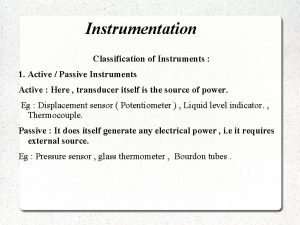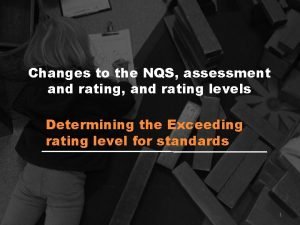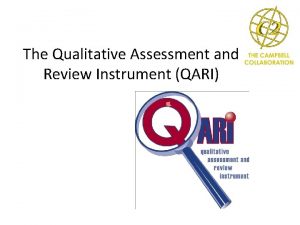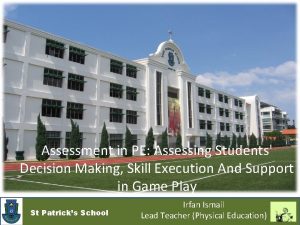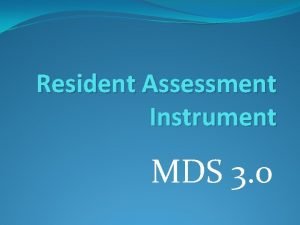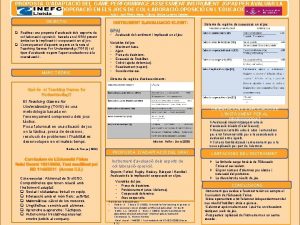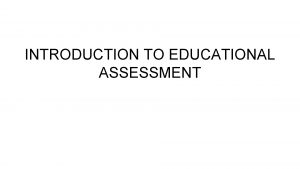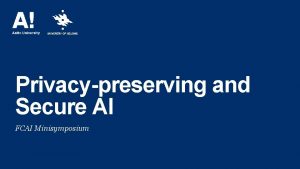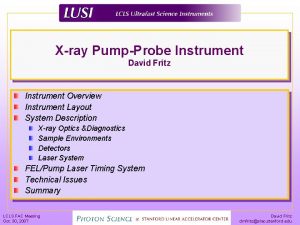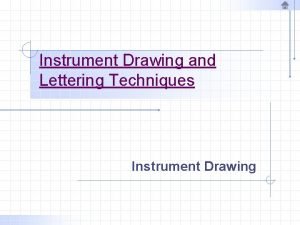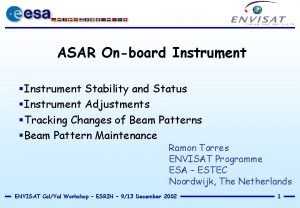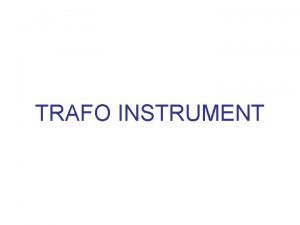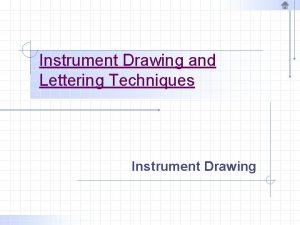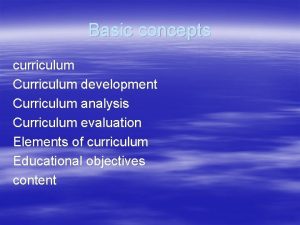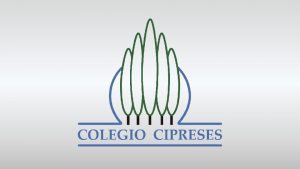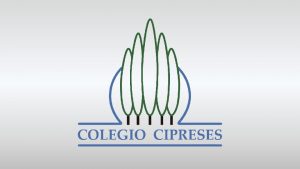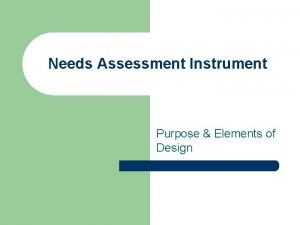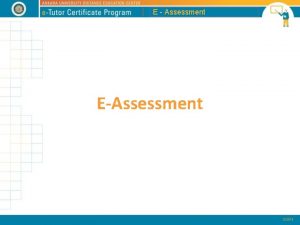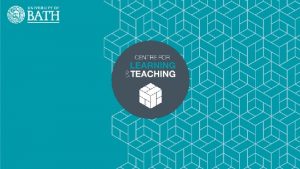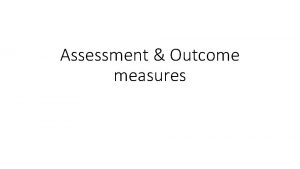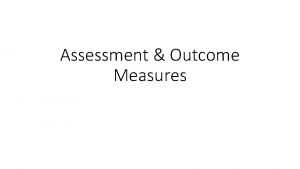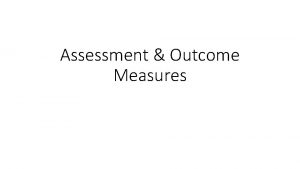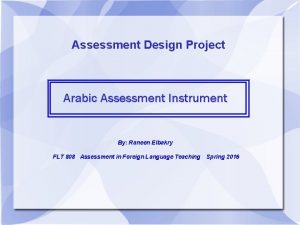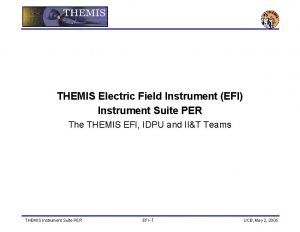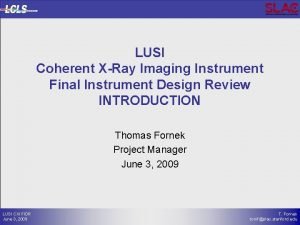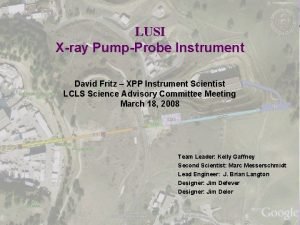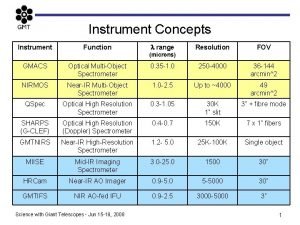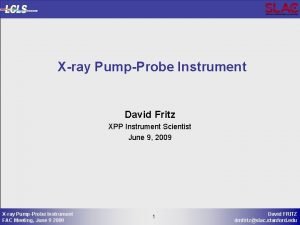USING THE CURRICULUM ASSESSMENT INSTRUMENT FCAI TO MEET
























- Slides: 24

USING THE CURRICULUM ASSESSMENT INSTRUMENT (FCAI) TO MEET THE CHALLENGES OF PROGRAM ASSESSMENT CSWE APM Dallas, Texas October 2017 www. SWEAPINSTRUMENTS. ORG

THE SWEAP TEAM Tobi De. Long-Hamilton Brandman University doctdh@gmail. com Kathryn Krase Long Island University, Brooklyn kathryn. krase@liu. edu Dorothy Farrell Brandman University farrel. dorothy@gmail. com Dan Freedman University of South Carolina Daniel. freedman@sc. edu Brian Christenson Capella University brian. christenson@capella. edu Kristin Danhoff Metropolitan State University of Denver kdanhoff@msudenver. edu Ruth Gerritsen-Mc. Kane University of Utah ruth. gerritsenmckane@socwk. utah. edu Tameca Harris-Jackson University of Central Florida Tameca. harris-jackson@ucf. edu Dana Sullivan Western Kentucky University Dana. sullivan@wku. edu Phil Ng Our Technical Guru! Phillip_Ng@URMC. Rochester. edu

Knowledge Based Assessment “Social work competence is the ability to integrate and apply social work knowledge, values, and skills to practice situations in a purposeful, intentional, and professional manner to promote human and community well-being” (CSWE EPAS 2015).

WHAT IS SWEAP? • SWEAP is committed to providing the highest quality assessment instruments • Designed to aid undergraduate and graduate social work programs in evaluation necessary for program development and improvement. • SWEAP instruments are specifically designed to be responsive to the Educational Policy and Accreditation Standards (EPAS) of the Council on Social Work Education (CSWE) • Related to both initial accreditation and reaffirmation. • However, each social work program is individually responsible for appropriately reporting and interpreting data provided through SWEAP instruments to CSWE.

What is Sweap? Social work Education Assessment Project • Non-Profit (501 c 3) • Volunteer Run • Service to Profession • Based out of Metropolitan State University of Denver RESULT: • 6 (copyrighted) instruments in support of program assessment and curriculum development.

SWEAP INSTRUMENTS SWEAP offers an assessment package for both BSW and MSW assessment. • Entrance • Exit • Alumni/Graduate & Employer • Curriculum Instrument (FCAI) • Field Instrument (FPPAI) • Instrument Customization for MSW Specialized Practice Assessment Today, our presentation will focus on the FCAI. If you would like more information about other instruments, please visit us at our booth.

Foundation Curriculum Assessment Instrument • Measures how well a program’s curriculum prepares students with the knowledge (CSWE dimension) necessary for competent professional social work practice. • The FCAI is an exam, designed to be taken by students as they enter a social work program and again at the time of exit, with the explicit purpose of testing for knowledge gained throughout the program’s curriculum.

Foundation Curriculum Assessment Instrument • The newest version (v 10) of the FCAI consists of multiple choice questions that evaluate student knowledge (one dimension) across all nine (9) competency areas of the 2015 EPAS • Prior instrument, with old report still available.

Total Respondents FCAI (2009 -2017) (ENTRANCE) (EXIT) 26, 544 18, 409 Current/ EPAS 2015 Responsive (Version 10) 8029 # of Programs 197

Curricular Components Curriculum Area Number of Questions Competency 1–Demonstrate Ethical and Professional Behavior 7 Competency 2 –Engage Diversity and Difference in Practice 6 Competency 3 –Advance Human Rights and Social, Economic, and Environmental Justice 6 Competency 4 –Engage In Practice-informed Research and Research-informed Practice 7 Competency 5 –Engage in Policy Practice 7 Competency 6 –Engage with Individuals, Families, Groups, Organizations, and Communities 5 Competency 7 –Assess Individuals, Families, Groups, Organizations, and Communities 5 Competency 8 –Intervene with Individuals, Families, Groups, Organizations, and Communities 5 Competency 9 –Evaluate Practice with Individuals, Families, Groups, Organizations, and Communities 5

Sample Practice Question • Determining progress toward goal achievement is one facet of the _____ stage. • • a. Engagement b. Evaluation c. Assessment d. Planning

STANDARDIZED MEASURE UNIVERSITY #1 Traditional Ø -----------Ø ------------ Online Ø -----------Ø ------------ UNIVERSITY #2 Traditional Ø -----------Ø ------------ Online Ø -----------Ø ------------ Δ Within Δ Between Allows For Direct Comparisons Both Within & Between Programs

V 9 Reliability Testing • Version 9 • Designed to assess how well programs provided students with knowledge of 7 different curricular areas • HBSE, Practice, Research, Ethics, Diversity, Policy, Social/Economic Justice • Students tested twice, 2 weeks apart • • • Cronbach’s alpha =. 784 Effect Size d = 6. 87 (from pre to post) Pearson’s correlation coefficient r =. 86 • v 9 tests, already taken, can report to 2015 EPAS • SWEAP recommends migrating to v 10

V 9 Item difficulty index • Overall difficulty or average should be around. 5 (Cohen & Swerdlik, 2005) • FCAI =. 523 (n=415) • “This is a very good difficulty level for the test. Not likely to misrepresent the knowledge level of test takers”.

Development of V 10 • In response to EPAS 2015 • Knowledge as a dimension of each competency • Further development of the FCAI question set • Development of new and modified questions, based on expert feedback (face validity) • Piloting of Instrument • BSW students • Item Difficulty Analysis (close to. 5)

V 10 Reliability Testing • Version 10 (In Progress) • • Students tested twice, 2 weeks apart Cronbach’s alpha = Effect Size d = Pearson’s correlation coefficient r =

V 10 Item difficulty index • Overall difficulty or average should be around. 5 (Cohen & Swerdlik, 2005) • Overall Test Difficulty • . 61 • Difficulty by Competency • Comp 1 • Comp 2 • Comp 3 • Comp 4 • Comp 5 . 63. 66. 65. 52. 50 • Comp 6 • Comp 7 • Comp 8 • Comp 9 . 59. 70. 73. 59

V 10 FCAI Report • Scale scores for each competency: • Aggregated by program, cohort, defined group • With comparisons to the national average. • For an additional cost, programs can order reporting of individual students’ scale scores. • Only available for online instruments and not available for paper. • Individualized reports DO NOT HAVE NAMES. • Programs will have to match students by student ID number. • NOT TO BE USED FOR GRADING

FCAI Report Overall Scores Pre-Post Reports are generated on the fly. Every time you download a report you are re-running analysis against updated database Competency “threshold” can be customized for $10

Expansion beyond BSW • Based upon CSWE assertions related to educational levels in social work education, we expanded testing to three additional groups: • MSW foundation students: • entering • exiting • Advanced standing students: • entering

Points to keep in Mind about the FCAI 1. Original purpose of this instrument • To review and improve curriculum 2. Under EPAS 2015, instrument can provide measure of knowledge dimension for each competency 3. Program should “monitor” scores over several years (or several cohorts) for trends. 4. FCAI is a measure of “value added” from program entry to exit. 5. Programs select own benchmarks (% of students who achieve). • Competency achievement is automatically set at 50% but can be changed at the request of the school (additional cost).

SWEAP BOOTH PLEASE COME BY AND SEE US AT OUR BOOTH #216

QUESTIONS? • SWEAP is committed to providing the highest quality assessment instruments • Designed to aid undergraduate and graduate social work programs in evaluation necessary for program development and improvement. • SWEAP instruments are specifically designed to be responsive to the Educational Policy and Accreditation Standards (EPAS) of the Council on Social Work Education (CSWE) • Related to both initial accreditation and reaffirmation. • However, each social work program is individually responsible for appropriately reporting and interpreting data provided through SWEAP instruments to CSWE.

Reference • CSWE (2015). EPAS Standards. Retrieved from: http: //www. cswe. org/getattachment/Accreditation/Ac creditation-Process/2015 EPAS_Web_FINAL. pdf. aspx
 Peace be with you till we meet again
Peace be with you till we meet again Active instrument example
Active instrument example Chapter 4 assessment identify and meet a market need
Chapter 4 assessment identify and meet a market need Instrument for curriculum evaluation
Instrument for curriculum evaluation Nqs assessment and rating
Nqs assessment and rating Qualitative assessment and review instrument
Qualitative assessment and review instrument Game performance assessment instrument
Game performance assessment instrument Resident assessment instrument definition
Resident assessment instrument definition Game performance assessment instrument
Game performance assessment instrument Http://quizizz.com
Http://quizizz.com Curriculum assessment and reporting framework
Curriculum assessment and reporting framework 2021 revised curriculum and assessment plans
2021 revised curriculum and assessment plans 2020 revised curriculum and assessment plans
2020 revised curriculum and assessment plans 2021 revised curriculum and assessment plans
2021 revised curriculum and assessment plans Revised programme of assessment 2020
Revised programme of assessment 2020 Conclusion of life skills
Conclusion of life skills Grade 7 geography term 1
Grade 7 geography term 1 2020 revised curriculum and assessment plans
2020 revised curriculum and assessment plans 2020 revised curriculum and assessment plans
2020 revised curriculum and assessment plans 2020 revised curriculum and assessment plans
2020 revised curriculum and assessment plans Qsa essential learnings
Qsa essential learnings 2020 revised curriculum and assessment plans
2020 revised curriculum and assessment plans Revised curriculum 2020
Revised curriculum 2020 Revised curriculum 2020
Revised curriculum 2020 2020 revised curriculum and assessment plans
2020 revised curriculum and assessment plans

